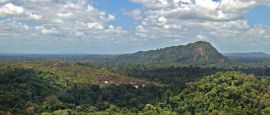Surinam History, Language and Culture
History of Surinam
By the time the Spanish arrived in the late-15th century the original inhabitants of Suriname, known as the Surinen, had been driven out by other Amerindian groups. Fierce resistance to colonisation deterred most would-be occupiers from Europe, although the territory changed hands many times between the Dutch, British and French before being confirmed as a Dutch possession by the 1815 Treaty of Vienna.
At this time, the majority of the population were slaves working on plantations and despite the abolition of slavery in 1863, conditions altered very little until the early 20th century and the discovery of large bauxite deposits, which brought about a major change in the economic and political complexion of the country.
In 1954, Suriname and the Netherlands Antilles became autonomous regions within the Kingdom of the Netherlands. When full independence was achieved in 1975 the new country's political parties were organised largely along ethnic lines – descendants of the black slave workforce, Indonesians, Indians, mixed-race Creoles and a small European contingent. The ensuing coalition governments tended to destabilise the political process and in February 1980, the coalition that had taken power in 1975 was overthrown by a popular military coup.
The new regime, under Lt-Col Desi Bouterse, cultivated close links with Cuba at the expense of those with the Netherlands. Then came a civil war, which broke out between the regime and jungle-based dissidents. The economic burden of the war prompted the military regime to return to civilian rule and a democratic constitution was agreed in March 1987 (a ceasefire with the guerrillas was finally reached in 1992).
After a dispute with elected President Ransewak Shankar in 1990, Desi Bouterse dismissed the government (by telephone!) and put the military back in charge before further elections in 1991. As his power waned in the 1990s Bouterse was convicted in absentia on drug smuggling charges in the Netherlands and sentenced to 11 years in prison.
Unsurprisingly the Dutch government said it would only maintain necessary contact with Desi Bouterse when he was elected as Suriname’s president in July 2010, a position he continues to hold.
Did you know?
• Although the official spelling of the country’s English name was changed to ‘Suriname’ in 1978, ‘Surinam’ is still found, notably by the national airline.
• Suriname is the only Dutch speaking country in South America.
• Suriname and neighbouring Guyana are South America’s only countries that drive on the left.




 You know where
You know where